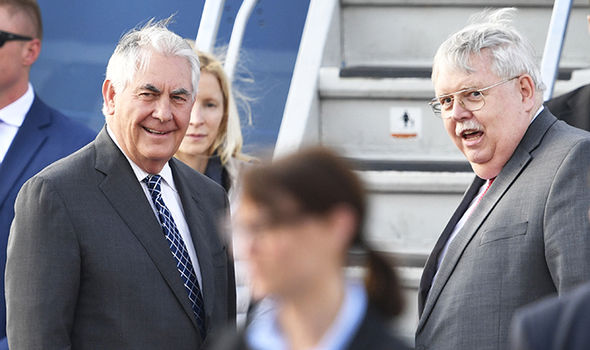Syria attack dashes hopes to resume US-Russia dialogue

By Olga Sorokina
Amid increasing tensions between the U.S. and Russia, U.S. Secretary of State Rex Tillerson and Russian Foreign Minister Sergey Lavrov met in Moscow on April 12 to discuss bilateral relations and the conflict in Syria. Tillerson repeatedly suggested Russia to break with Bashar Assad and realign with the West.
"Would Russia prefer to realign with the United States, with other Western countries and Middle East countries that are seeking to resolve the Syrian crisis?" Tillerson asked, calling Assad an 'unreliable partner' for Russia.
Russia's Foreign Ministry said it was preparing a statement regarding U.S. strikes against a Syrian base. Moscow stands on the position that the U.S. missile attack on Syrian Government al-Shairat Airbase undermines powers which fight terrorism.
Moscow called the attack an 'act of aggression against a sovereign state' and a violation of the international law. "Russia does not interfere in the domestic matters of other countries," Sergei Lavrov previously said to the journalists.
However, two diplomats agreed that two countries should fight terrorism together. Russian president Vladimir Putin promised to get back to the 'Memorandum on the prevention of incidents and ensuring air safety during operations in Syria' in case if the U.S. administration confirms its commitment to fight terrorism together, said Lavrov.
Meeting with President of Russia Vladimir Putin has disappeared from the schedule of U.S. Secretary of State Rex Tillerson, wrote on his Twitter White House Voice of America bureau chief Steven Herman.
Russia not convinced by US evidence on Syria
Washington alleges Assad regime used chemical weapons in an attack on April 4 that killed more than 80 people.
However, Kremlin is 'not convinced' by evidence that showed the Assad regime was culpable in the alleged Khan Sheikhoun chemical attack and calls for an 'objective and honest' investigation, without relying on the evidence provided by the White Helmets'.
"Syrian chemical arms could have been captured and used by terrorist organizations. Now Assad regime has nothing left… Chemical weapons employment serves no one's interest besides from the terrorist groups', said Igor Nikulin, former member of the UN Commission on biological and chemical weapons, in the interview to 'Baltkom' radio station. "And the U.S. reaction only proves the point. They launched the attack without any warning,' said Nikulin.
Syrian President Bashar Assad previously said in an interview with Yahoo News that the United States is welcome to join the battle against 'terrorists' in Syria — as long as it is in cooperation with his government and respects the country's sovereignty.
"The U.S. is flexing muscles before talks"
Responding to the claims by Tillerson that Russia carries some blame for the chemical attack as it supports Assad's regime, Foreign Ministry spokeswoman Maria Zakharova told independent news channel 'Dozhd' that the U.S. was 'flexing muscles' before talks.
"In general, this is one tactic in the negotiation process — indicate your most radical positions and then through the course of negotiations, balance them, finding some points of compromise," she said.
U.S.-Russia relations: past and future
Rex Wayne Tillerson is officially a friend of Russia, wrote Russian foreign media observer 'InoSMI' in December 2016, pointing to the fact that the former executive of ExxonMobil received Russia's 'Order of Friendship' for the historical agreement to develop Arctic oil deposits together with the Russian 'Rosneft'.
Under Tillerson's leadership ExxonMobil followed the U.S. sanctions against Russia, even though Tillerson openly opposed them. This fact, somehow, built a hope that once Tillerson enters the White House, U.S.-Russia relations may improve.
Immediately after Trump's victory, Russian president Vladimir Putin stated that Moscow looks forward to restoring bilateral relations with the United States.
April 11-12 Rex Tillerson visited Moscow for the first time as the US Secretary of State. Rex Tillerson and Russian Foreign Minister Sergey Lavrov did not discussed changes in sanctions against Russia during the visit, the fact which caught attention of Russian internet community.
However, on April 11 foreign ministers from the Group of 7 rejected new sanctions against Russia for its support of Syrian president. Instead, they opted for a more diplomatic approach of engaging in discussions with Russia.
This brings a hope for a new round of dialogue after a proper investigation of the alleged Khan Sheikhoun chemical attack.
Olga Sorokina is a former video producer at Russia's First National TV Channel and columnist for the BRICS magazine. The author holds a master's degree in Global Business Journalism from Tsinghua University.






